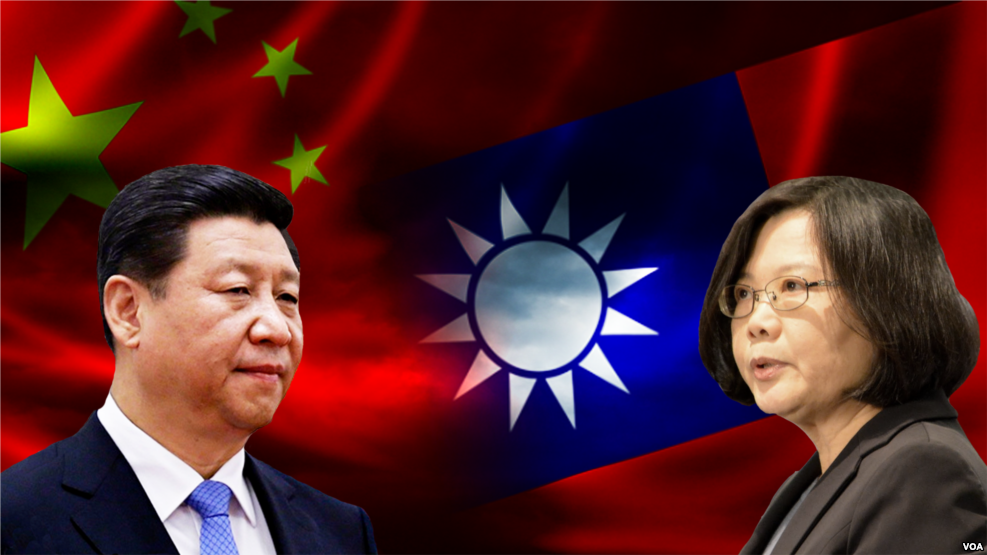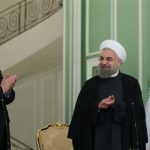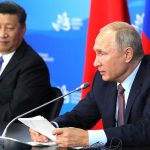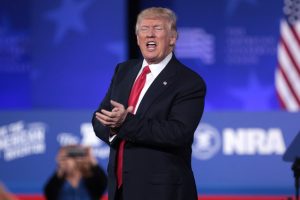by Chas W. Freeman, Jr.
Recent events have conspired to compel Beijing to consider whether the moment to resolve the Taiwan question once and for all may soon be at hand. The question at issue is not whether Taiwan is part of China. Chiang Kai-shek’s stubborn nationalism and decades of tough Chinese diplomacy have achieved global deference to the “legal fiction” of a single “China” that includes Taiwan. What remains unsettled is Taiwan’s political relationship with the rest of China, if any. Everyone agrees that this must be worked out between the two sides of the Taiwan Strait. But how? Through negotiations, the use of force, or some combination of the two? And when? It seems we may soon know.
Mao Zedong never believed in the possibility of peaceful reunification of his country, but he did nothing serious to build a military capability to recapture Taiwan. By contrast, Deng Xiaoping was prepared to appease Washington by giving peaceful resolution of Taiwan’s status a chance. He followed the normalization of relations with offers of cross-Strait postal, transportation, and trade links. He never ceased to defend China’s right to use force to impose its authority in Taiwan. But, in the 1982 “8/17 Communiqué,” after the U.S. undertook to cap the quality and reduce the quantity of arms sales to Taiwan, Deng committed China to make every effort to achieve Taiwan’s reintegration by peaceful means.
Ten years later, the U.S. effectively scrapped its part of the 8/17 bargain with a huge arms sale to Taiwan, Beijing nonetheless stuck with efforts at peaceful reunification. In January 1995, with Deng’s blessing, Chinese President Jiang Zemin elaborated an “eight-point proposal” for reunification on terms that would leave Taiwan’s political economy and self-governance unchanged. Taiwan president Lee Teng-hui rejected this. In July 1999, he announced that Taiwan and China were two separate states. Beijing saw this, correctly, as a declaration of independence in all but name.
In response, China began for the first time to plan and fund a serious effort to acquire the ability to use force against Taiwan. At the same time, it redoubled its “united front” policy, which aims to build cross-Strait relationships and erode Taiwan’s opposition to reunification. In effect, Beijing adopted a “two-handed” policy, in which one hand beckoned Taiwan toward reconciliation while the other formed an ever-more menacing fist. Immediate carrot; latent stick.
As the 21st century began, Taiwan’s first non-Kuomintang (KMT) leader, Chen Shui-bian took steps toward independence that the United States as well as China both came to see as provocative and destabilizing. Beijing and Taipei seemed headed toward conflict that could draw in the United States. By December 2003, President George W. Bush had joined Chinese Premier Wen Jiabao in opposition to Chen’s initiatives and made it clear that, while opposing the use of force by either side, the United States did not support unilateral actions by Taiwan like secession from “China.”
In the Spring of 2005, China adopted a tough “Anti-Secession Law,” authorizing the use of force to prevent Taiwan independence. But soon thereafter, former Republic of China (ROC) vice president and KMT Chairman Lien Chan led a large delegation to the China mainland, where he met his Chinese Communist Party (CCP) counterpart, Hu Jintao, and each pledged allegiance to his own version of the “one China” principle. Pursuant to this principle, the two sides concluded a fifteen-point KMT-CCP agreement on specific projects to promote cross-Strait linkages. The subsequent election of Ma Ying-jeou (Lien’s successor as Chairman of the KMT) to two four-year terms as president in Taipei ushered in a new era in cross-Strait relations. This was characterized by the progressive relaxation of tensions, the institutionalization of mechanisms for greatly expanded economic and cultural interaction, and fora for dialogue between the Taipei and Beijing authorities.
The remarkable rapprochement between Taipei and Beijing between 2005 and 2015 led many to hope for the first time that some sort of peaceful resolution of the differences between the two sides might ultimately be possible. The era of good feeling in cross-Strait relations culminated in an historic meeting between KMT and CCP Chairmen Ma and Xi in Singapore on November 7, 2015. But, shortly thereafter, Ma was succeeded as president in Taipei by Tsai Ing-wen, a cautious but dedicated proponent of Taiwan independence. She rejects Ma’s notion that cross-Strait relations are between different regions of the same country, i.e. “China,” and will not deal with Beijing on that basis.
Since Tsai’s inauguration, cross-Strait relations have steadily deteriorated. Confidence in progress toward reconciliation has disappeared. By the time Donald Trump was elected president of the United States, all progress in cross-Strait relations had been frozen. Chinese began to return to Mao Zedong’s view that the Taiwan issue could only be resolved through the use of force. It was in this context that the U.S. president-elect:
- arranged an unprecedented congratulatory telephone call from Taiwan’s leader, implying a willingness to upgrade relations with Taipei;
- suggested that he saw no reason to be bound by previous U.S. commitments to “one China” and was prepared to relitigate the Taiwan issue with Beijing;
- declared that he favored a major expansion of the U.S. nuclear arsenal;
- reaffirmed his intention to reduce US-China economic interdependence by penalizing Chinese exports to the United States and abandoning any interest in China’s continued prosperity;
- indicated, through his Secretary of State-designate, that the United States should be prepared to block Chinese access to the land features it had fortified in the South China Sea; and
- appointed a clutch of notorious Sinophobes as senior advisers to his administration.
From China’s point of view, these developments came on top of progressive American nibbling away at the terms by which the United States had agreed to maintain sub-official relations with Taiwan. They reminded Chinese of the sudden U.S. abandonment in 1992 of the constraints on arms sales to Taiwan that the Reagan administration had accepted in the 8/17 Communiqué of 1982. The Trump administration’s signals were accompanied by aggressive American talk about escalating naval operations intended to call out China on its maritime claims in both the South and East China Seas. They resonated with much-ballyhooed proposals for “Air-Sea Battle” to enable the U.S. armed forces to penetrate China’s defenses and assault targets deep in the Chinese homeland. And they were complemented by American nuclear weapons modernization programs and related ballistic missile defense deployments that both China and Russia assess as an effort by the United States to acquire the ability to decapitate their governments in a surprise attack.
Subsequent backing and hauling by the Trump administration simply underscored to Chinese the unreliability of its word and the folly of relying on it. In private, Xi Jinping reportedly took the view that the new administration resembled a “bull in a china shop” that was breaking crockery as it settled into the unfamiliar confines of government. His view was that China should accept the breakage, remove the more valuable pieces from the shop to preserve them, focus on core interests, and let the bull settle down before attempting to communicate with it.
Still, Beijing has appeared to hedge against American perfidy by deciding to:
- roll up up the island’s residual diplomatic relations and curtail its quasi-official presences in other countries and international organizations so as to inculcate in Taipei a sense of inexorable international isolation;
- inaugurate escalating air and naval operations on all sides of the island to remind Taiwan of its growing military inferiority and vulnerability;
- step up “united front” policy both by officially celebrating the February 28, 1947 Taiwanese uprising against the KMT and by wielding sticks as well as carrots in relations with the Taiwanese business community;
- draft a “unification law” to supplement or supersede the “Anti-Secession Law” of 2005 and to authorize compellence of reunification, not just deterrence of separatism; and
- move experts on strategic maneuver and crisis management into key positions dealing with Taiwan in apparent anticipation of some sort of showdown.
Whether or not the Trump administration launches the trade war it has threatened against China and other trade-surplus countries, it is likely that Beijing will now:
- object more forcefully than before to any new American arms sales to Taiwan;
- conduct military exercises in the Philippine Sea that involve firing missiles over Taiwan to increase the island’s awareness that it is threatened in ways that the United States cannot counter;
- contest the median line in the Taiwan Strait and, possibly, Taiwan’s occupation of the Pratas [Dong Sha] cays and Taiping Island in the Spratly group;
- prepare for a military showdown with Washington by significantly augmenting China’s nuclear deterrent and second-strike capability to be able to achieve the effective annihilation of the United States, not just its maiming; and
- update Taiwan-related military campaign plans to incorporate the latest twists in “hybrid warfare.” (Hybrid warfare blends conventional warfare, irregular warfare, cyber warfare and subversion, and blurs the formal distinction between war and peace. It is characterized by the use of fictitious propaganda, deniable forces, espionage, the mobilization of minorities, and terrorism.)
These and related measures would set the stage for coercive diplomacy and an endgame in China’s strategy for resolving the Taiwan problem.
When might this happen? There is an obvious deadline for bringing Taiwan to heel: the 100th anniversary of the founding of the CCP in 2021.
It is easy for Americans to forget what an affront to Chinese sensibilities Taiwan’s de facto separation from the rest of China represents. Taiwan is a symbol of China’s past impotence in the face of foreign bullying. It is an ongoing reminder of Japanese imperialism, of the foreign division of the country into spheres of influence, of the unfinished Chinese civil war, and of American intervention in that war to prevent victory for the CCP. Taiwan’s status as a client of America has long presaged a bloody rendezvous with Chinese nationalism.
China has toyed with deadlines for resolving the Taiwan issue before. The recovery of Hong Kong in 1997 and Macau in 1999 led Chinese President Jiang Zemin briefly to aspire to a trifecta. He wanted to set a date certain for resolving Taiwan’s relationship with the rest of China. His successor, Hu Jintao, wisely operationalized patience. But, in 2013, soon after Xi Jinping came to power, he pointedly remarked that the Taiwan question “must reach a final resolution, step by step, and . . . cannot be passed on from generation to generation.”
President Xi has not publicly set a deadline for formalizing Taiwan’s reunification with the rest of China. It’s doubtful that he will. But vanity, in the form of the search for an historical legacy, and national pride, in the ramp up to the July 1, 2021, hundredth anniversary of the founding of the Chinese Communist Party, provide ample motivation for China’s current leadership to adopt this as a goal. Sooner than many think, Beijing may feel compelled to make Taipei an offer it cannot refuse.
Remarks prepared for a Roundtable on China-Taiwan Relations in the Tsai Ing-wen Era, February 22, 2017, Philadelphia, Pennsylvania
Chas Freeman served as US ambassador to Saudi Arabia during the war to liberate Kuwait and as Assistant Secretary of Defense from 1993-94. He was the editor of the Encyclopedia Britannica entry on “diplomacy” and is the author of five books, including “America’s Misadventures in the Middle East” and “Interesting Times: China, America, and the Shifting Balance of Prestige.” He is a senior fellow at the Watson Institute for International and Public Affairs at Brown University.
Photo: Xi Jinping and Tsai Ing-wen






Why doesn’t China create a Chinese Commonwealth and apply this to Taiwan? That way it has its own right to be a self governed, its own identity, and other legal aspects in which to peaceful means to be sovereign? This can also be applied to Hong Kong and Macau, in which the power is back to its own people and its own system, give it time to matriculate and progressive show care, no way subordinate one to another in any aspect of their domestic or external affairs, though united by a common allegiance to the CCP and freely associate as members of the International stage, the dominions were recognized as separate states, entitled to have separate representation in other world organisations, to appoint their own ambassadors, and to conclude their own treaties. This might bring the best effort to win the will of the people and show the world stage that China has humanity and to govern peacefully.
Nice long post you got here. But in all that writing, you fail to ever consider the Taiwanese legacy of independence and the desire for self-determination. Poor China and their impotency; it must feel so awful getting “bullied” by Tibet, and Hong Kong, and Vietnam, and the Philippines. It must be so awful to be the second-largest economy and the fourth-largest landmass on the planet… heaven forbid any of those countries assert their right to be separate from a communist autocracy.
Please be careful how much blame for this issue you put on the West and Taiwan. Chinese nationalism is the main factor destabilizing the region. Taiwan has every right to continue along the path they have set for themselves. If we can agree that democracy is a fundamentally better system for promoting Taiwanese values, then we can agree that Chinese “reunification” (a poor choice of words given that the country was never really a part of China and was only partially influenced by the Qing dynasty) would be a travesty. Seriously, the Japanese have a far better claim, but we don’t hear much about their imperialistic machinations in the South China Sea now do we?
In my opinion, it is utterly shameful to suggest that the Taiwanese aspiration to a globally-recognized independence is anything but praiseworthy in the West, and we should be doing all we can to preserve it. It wouldn’t take long for China to fold under worldwide pressure, but then again, the world needs to ween itself off its cheap-shit fix.
Do you mean the “peaceful” “re”unification that is supported by tens of thousands of Chinese missiles aimed at Taiwan? Or just the way that China’s nominally Communist aristocrats hire gangsters to demonstrate against liberal democracy and the rule of law in Taiwan? Or perhaps it’s the carpetbagging encouraged by poor, put-upon China as it bribes countries with ties to Taiwan to drop them? Or maybe it’s the bullying of foreign courts to report Taiwanese wrongdoers to the separate, foreign state of the Peoples Republic of China? Or the similar bullying to keep Taiwan out of international organisations concerned with civil aviation, public health or international peacemaking?
Perhaps if the PRC took better care of its own people it would not need the sabre-rattling at Taiwan preferred by Beijing’s élites to a mature foreign policy aimed at securing peace in the region. Taiwanese people are proud of expressing their will to resist a forced Anschluss – through the ballot box, as is their right. If that makes the Beijing élites tremble even more than the continuing immolations in Tibet, then the fault may lie closer to home than in the de facto state of Taiwan or the de jure state of Tibet.
Charles Freeman always provides us with information clearly presented and thought-provoking. To think that many of us hoped that if Trump won the election, Hillary’s likely warmaking would happen while Trump would be a dealmaker and peaceful!!!
Sorry, I forgot the NOT before “happen” ie that we could avoid conflict .